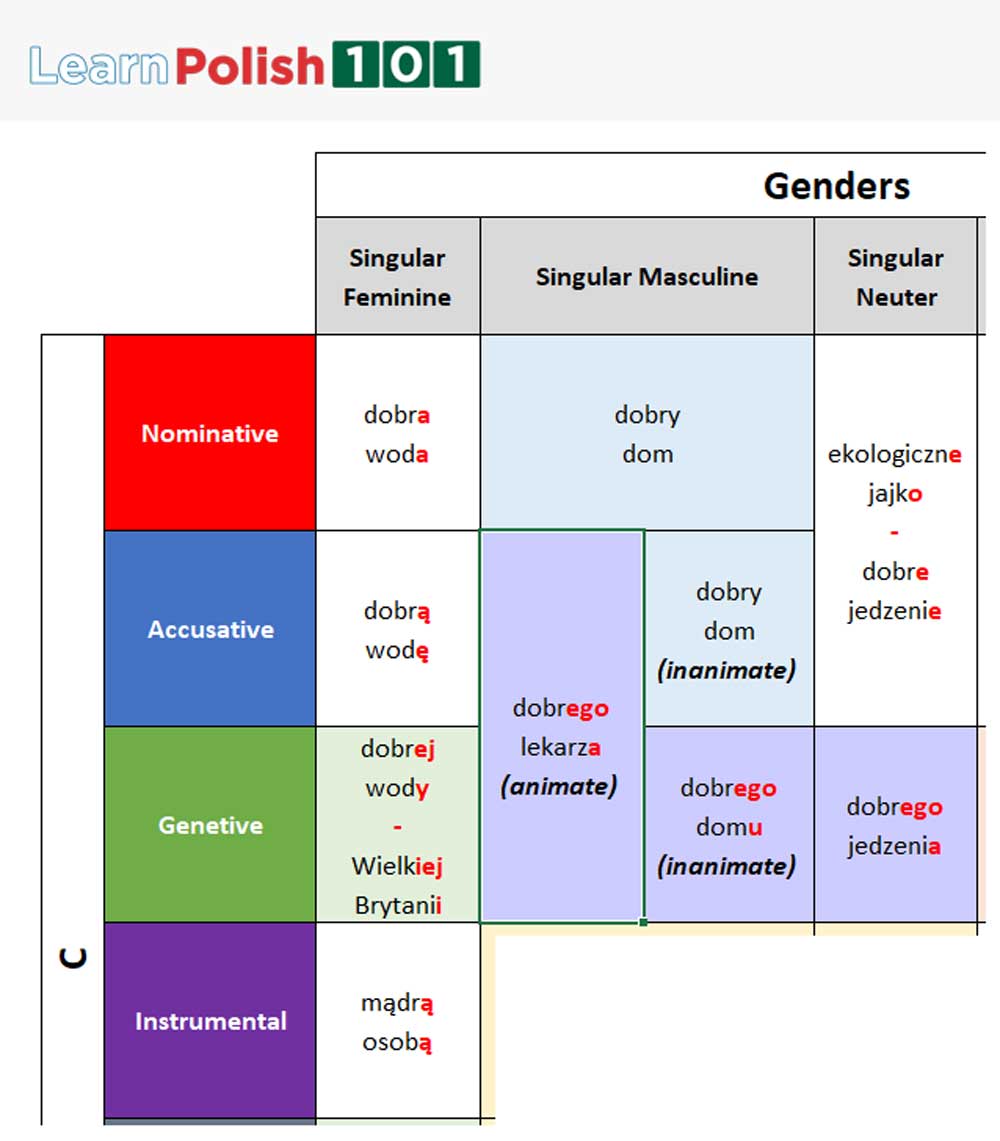Polish Grammar - Instrumental Case - Feminine
We've seen how we can describe what we are like (Jestem mądry). Now we'll look at how to say who we are. This takes us into the next Grammar Case - Instrumental'

We know three grammar cases so far for feminine nouns like 'woda' and how these cases change the endings of the nouns and their adjectives
- Nominative - describing what something is - To jest mineralna woda
- Accusative - after a verb being used positively - Mam dobrą wodę
- Genetive - when something is missing or lacking - Nie mam dobrej wody
The next case is:
- Instrumental - describing who someone is - e.g. I am a woman, You are a doctor, etc.
The mental hook is to think of yourself as the 'instrument' or as an 'instrumental' person.

In the Instrumental case we make the following changes if the noun is feminine
- Adjective ending - changes from 'a' to 'ą' - mądra -> mądrą
- Noun ending - also changes from 'a' to 'ą' - kobieta -> kobietą)
So basically you can remember it as the case with 'matching endings'.
- A clever woman - Mądra kobieta
- She is a clever woman - Ona jest mądrą kobietą
Listen to the audio several times to get familiar with the change in pronounciation.

- A person / an individual - Osoba
This noun ends in 'a' so we know it is feminine. So how would you say:
- I am a clever person -
- You are a clever person -
- He is not a clever person -
- She is not a clever person -
Note that the gender of the person being taked about is not important here. As we have a noun (Osoba) the gender of the noun is what is important.
Continuing to build on the table we started when looking at the Accusative case, here is the Instrumental rule for word endings for feminine nouns


Go slow!
The exercises for this lesson will take time. You may need to check your notes or scroll up to the lesson learning points several times.
This is normal.
By repeating the learning points using these interactive exercises over several days you will become faster and the knowledge will embed better in your long term memory.
Nominative and Instrumental
Sort the nouns below into their Nominative or Instrumental cases. You don't need to know all the words, you just need to know the endings
Drag and drop all the dark blue boxes to their correct locations
Make sure your sound is turned on to hear the audio during this exercise
Warning: Undefined array key "correct_answer_text" in /var/www/vhosts/learnpolish101.com/httpdocs/includes/func/what-do-you-know-func.php on line 588
Warning: Undefined array key "incorrect_answer_text" in /var/www/vhosts/learnpolish101.com/httpdocs/includes/func/what-do-you-know-func.php on line 589
Refresher
Tap and match the Nominative and Instrumental forms of adjectives
Make sure your sound is turned on to hear the audio during this exercise
Think out the Polish
Try the phrases covered in the lesson by thinking them out rather than remembering them.
Make sure your sound is turned on to hear the audio during this exercise
She is a clever woman | |
I am a clever person | |
You are a clever person | |
He is not a clever person | |
She is not a clever person | |
Transfer Nominative nouns to Accusitive
In the following exercise you'll change nominative nouns to the instrumental case even though you probably do not know most of the words.
The nominative case of the noun is shown beside the text input box in brackets. Write the full sentence using the Instrumental case endings.
For example, the first sentence is 'She is a good daighter'. The Polish for 'daughter' is 'córka' so the correct answer is 'Ona jest dobrą córką'Make sure your sound is turned on to hear the audio during this exercise
She is a good daughter | (córka)
|
She is not a good student | (studentka)
|
She is an interesting person | (ciekawa osoba)
|
I am a new (female) student | (studentka)
|
You are not an old woman | |
You are a bad person | |
I know that she is a good sister | (siostra)
|
I think that she is a clever woman | |
She is not a clever person but she is a good student | (studentka)
|
She is an old woman but she is an interesting person | (ciekawa osoba)
|
Are you a new (female) student? | (studentka)
|
Do you think that you are a clever person? | |
She thinks that she is a rich woman because she has a house | |
You think that you are a clever person but I don't think so | |
Refresher
Revise earlier words and phrases to keep them fresh! Match the Polish and Engish below
Make sure your sound is turned on to hear the audio during this exercise
Nouns
Tick all of the adjectives which are in feminine Instrumental form
Tick all of the boxes you believe are correct
